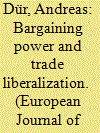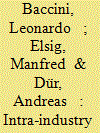| Srl | Item |
| 1 |
ID:
085400


|
|
|
|
|
| Publication |
2008.
|
| Summary/Abstract |
Shortly after the creation of the European Economic Community (EEC, 1958), European countries accepted a far-reaching liberalization of their previously fairly protectionist external trade relations. I provide an explanation of this astonishing development that builds on the argument that the establishment of a customs union increases the bargaining power of its member countries in international trade negotiations. When facing discrimination from a customs union, exporters in excluded countries have an incentive to become politically active and lobby their governments for relief. This increase in exporter lobbying, in turn, weakens the negotiating position of excluded countries in international trade negotiations by making them more eager to achieve a negotiated agreement that lowers the external barriers of the customs union.
|
|
|
|
|
|
|
|
|
|
|
|
|
|
|
|
| 2 |
ID:
160572


|
|
|
|
|
| Summary/Abstract |
This research note presents a new dataset on the speed of tariff liberalization in sixty-one preferential trade agreements (PTAs) signed by fifty states and regional economic organizations over the period 1995 to 2013. We use this dataset to test prominent arguments concerning the impact of intra-industry trade and global value chains on the political economy of trade. Our results indicate that the speed of tariff liberalization through PTAs is considerably faster for intermediate goods than for finished products. This is in line with the most prominent argument about how global value chains affect the political economy of trade liberalization. At the same time, we find mixed evidence for the impact of intra-industry trade on the ease of trade liberalization, which reflects strong cross-country variation. We conclude with a discussion on how the dataset can help tackle important questions in international political economy and inform ongoing debates on trade agreements.
|
|
|
|
|
|
|
|
|
|
|
|
|
|
|
|
| 3 |
ID:
146158


|
|
|
|
|
| Summary/Abstract |
Existing research indicates the interrelated nature of different dimensions of the design of international institutions. In particular, it shows the greater flexibility of deep agreements. We argue—and demonstrate empirically—that the positive relationship between depth and flexibility holds for preferential trade agreements (PTAs). But we add two qualifications to the conventional wisdom that depth and flexibility go hand in hand. First, we argue that the positive relationship between depth and flexibility proves weaker for democracies than for nondemocracies. Second, when making deep agreements more flexible, countries also add strings to the use of the additional flexibility provisions. An original data set on the design of 587 PTAs allows us to test our arguments. Both descriptive evidence and multivariate statistics support the theoretical expectations. The findings contribute to the literatures on the design of international institutions and the causes and consequences of PTAs.
|
|
|
|
|
|
|
|
|
|
|
|
|
|
|
|